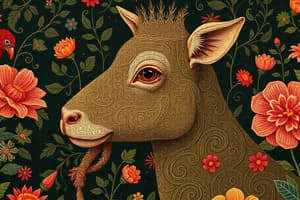Podcast
Questions and Answers
What is biology?
What is biology?
Biology is the science of life, encompassing the study of organisms, their structure, function, growth, evolution, and distribution.
How do biologists uncover facets of life?
How do biologists uncover facets of life?
Biologists investigate the processes that govern the existence of animals to uncover many intriguing facets of life.
What specialized structures are found in animal cells?
What specialized structures are found in animal cells?
Animal cells contain specialized structures like mitochondria (which generate energy) and the nucleus (which houses genetic information).
What is nutrition in animals?
What is nutrition in animals?
What are the main nutrients obtained by herbivores from their diet?
What are the main nutrients obtained by herbivores from their diet?
What nutrients do carnivores obtain from their diet?
What nutrients do carnivores obtain from their diet?
What is the role of vitamins like thiamin in animal health?
What is the role of vitamins like thiamin in animal health?
What is the consequence of vitamin C deficiency in guinea pigs?
What is the consequence of vitamin C deficiency in guinea pigs?
Why is the study of animal metabolism important in nutrition?
Why is the study of animal metabolism important in nutrition?
How does striking a balance between energy intake and expenditure impact animal health?
How does striking a balance between energy intake and expenditure impact animal health?
Study Notes
Understanding Science: Exploring Biology and Nutrition in Animals
Science is a fascinating realm where knowledge is continuously expanding, with biology and nutrition playing crucial roles in understanding the lives of animals. From the intricate workings of organisms to the sources of energy that fuel their daily activities, these subfields offer insight into the complex world of our animal friends.
Biology Basics
Biology is the science of life, encompassing the study of organisms, their structure, function, growth, evolution, and distribution. By investigating the processes that govern the existence of animals, biologists have been able to uncover many intriguing facets of life.
For instance, consider the complexity of the human body, which shares many fundamental similarities with other animals, such as the structure and function of their cells, tissues, and organs. This commonality underscores the unity of life, as well as the evolutionary relationships among species.
At the cellular level, animals are made up of cells that contain specialized structures such as mitochondria, which generate energy, and the nucleus, which houses the genetic information that directs cellular processes. In animals like humans, these cells are organized into tissues, organs, and systems, which work together as the body's functional units.
Nutrition in Animals
Nutrition is the science of food, its composition, and the body's response to it. As animals consume food and absorb nutrients, they obtain the energy and materials they need to grow, reproduce, and maintain their normal bodily functions.
For herbivores, their diet typically consists of plant matter, providing them with carbohydrates, fiber, and other essential nutrients. Carnivores, on the other hand, obtain their nutrients from animal sources, consuming proteins, fats, and other nutrients.
Nutrition also encompasses the study of animal metabolism, the process by which animals break down food into energy and other essential molecules. Metabolism is highly regulated, with animals needing to strike a delicate balance between energy intake and expenditure to maintain their overall health and well-being.
Intersection of Biology and Nutrition
The study of nutrition is closely intertwined with biology, as it investigates the specific nutrient requirements of animals and their impact on growth, health, and behavior. Nutritional biologists examine the role of specific nutrients in animal metabolism, physiology, and the interaction between diet and disease.
For example, the notorious vitamin C deficiency in guinea pigs (ascorbate deficiency) can lead to scurvy, a disease that affects bone and connective tissue health. Similarly, the B vitamins, such as thiamin, are essential for the normal functioning of the nervous system in many animals, including pigs and chickens.
Toward a Deeper Understanding
The study of biology and nutrition in animals is fundamental to our understanding of the natural world. As new discoveries are made and our knowledge grows, we can better address pressing issues such as food security, animal health, and wildlife conservation.
In recent years, biologists and nutritionists have been working to uncover the secrets of animal genetics, metabolism, and ecology, shedding light on the complex relationships that exist among species. By understanding the biological and nutritional needs of animals, we can develop more sustainable practices for feeding and caring for them, ensuring their well-being and the health of our planet.
One exciting development is the ongoing exploration of the "No Search" feature in Bing Chat, which allows researchers to pose questions to the AI without the need for web searches. This feature could potentially accelerate scientific discovery by enabling researchers to focus on complex problems that do not require a web search to find solutions.
As we continue to unravel the mysteries of life, the study of biology and nutrition in animals will remain a critical component of our scientific endeavors. By examining the intricate processes that govern their existence, we can better understand the world in which we live and create a more sustainable future for all living beings.
Studying That Suits You
Use AI to generate personalized quizzes and flashcards to suit your learning preferences.
Description
Discover the fascinating world of biology and nutrition in animals, exploring their structure, function, metabolism, and nutrient requirements. Learn about the intricate processes that govern the lives of animals and the essential role of nutrition in supporting their growth, health, and well-being.




